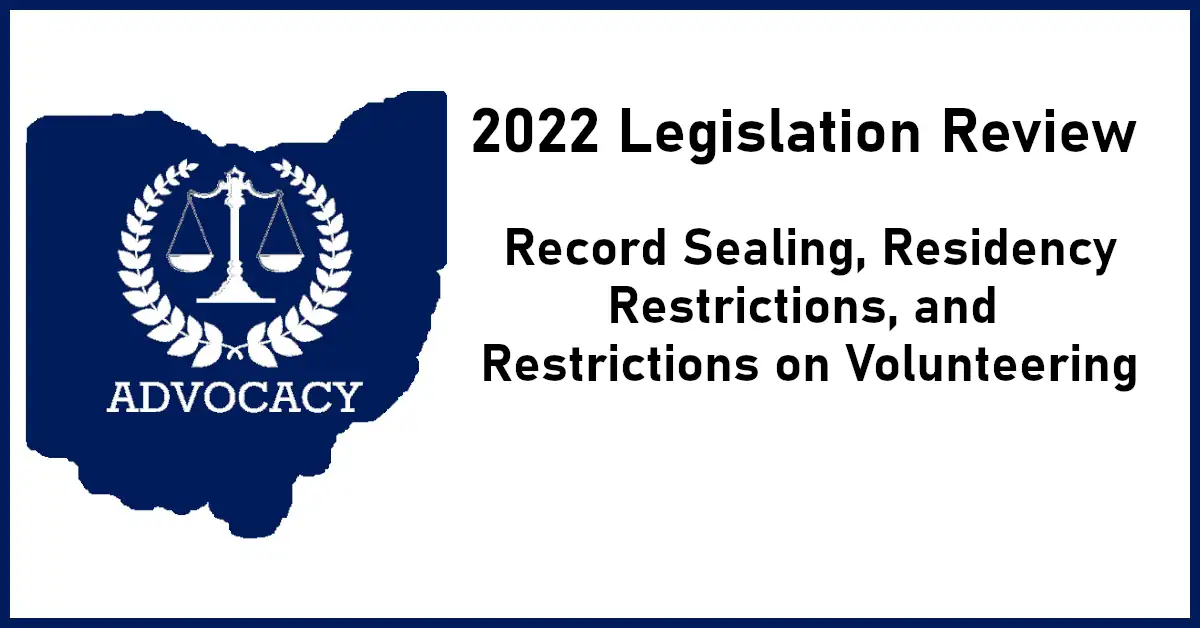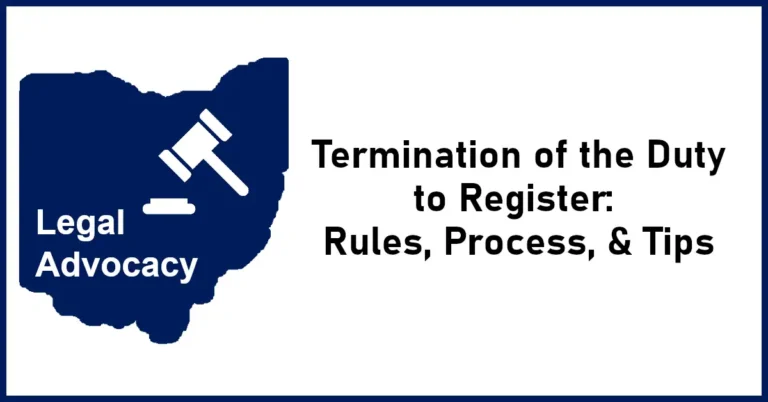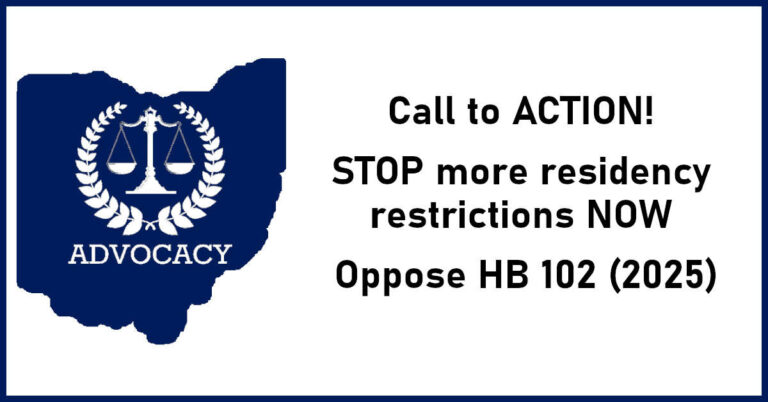by Barbara Wright, Legal & Legislative Liaison, OHRSOL
Some good legislative news in 2022: the 134th General Assembly seemed to recognize OHRSOL’s stance that a person who commit a sexual offense is not a continuing threat to commit sexual violence. Lawmakers passed legislation allowing persons with a sexual offense to apply for record sealing and expungement.
On the other hand, the legislature passed two separate bills further restricting the freedom and dignity of certain persons required to register. Two new bills impose new residency restrictions and restrictions on the right or opportunity to volunteer in any meaningful way in the life of one’s own child.
This legislation illustrates the importance of the continuing fight to educate lawmakers and the public about the myths and facts of sexual offense registration. OHRSOL did exert some influence on this legislation, thanks to the efforts of a few dedicated members. But we have a long way to go to convince legislators that people who are convicted of a sexual offense deserve to be treated with the same dignity as other human beings.
We cannot continue this fight without YOU.
The following legislation and concessions made by lawmakers as a result of our efforts demonstrate baby steps in the fight for evidence-based, cost-effective laws regarding sexual offense registration.
Record Sealing and Expungement
Ohio Senate Bill 288 started as a 4,000 page criminal justice reform bill. By the end, many of the reform provisions were stricken, and several more onerous provisions were added to satisfy prosecutors and other interested parties opposed to any “softening” of our laws. But several provisions representing progress remained:
- Record sealing and expungement of many convictions for sexual offenses which were not previously eligible for sealing.
- Minor concessions to the requirements for filing a petition for modification or termination of the duty to register under R.C. 2950.151.
- Judicial release, earned credit, bail, and other reform
OHRSOL actively supported the record sealing and expungement provisions, despite assertions by members of the House Criminal Justice Committee that “even a low-risk offender, an 18-year old who had consensual sex with his 17-year old girlfriend, has trouble not wanting to re-offend.” The Representative would not accept evidence that the passage of time and advanced age lower recidivism. OHRSOL and the Ohio Public Defender pointed out that the average person convicted of a sexual offense when he was 18 would be at least 58 before he/she could seek expungement.
In the end, the committee allowed expungement after ten years, subject to minor revisions in favor of law enforcement hiring. In the case of persons convicted of a sexual offense, this was a moral victory.
Record Sealing (NEW R.C. 2953.32)
- Record sealing is available for many sexual offenses, provided they meet the following exclusionary criteria:
- the offense is not a first or second degree felony;
- the victim is not under the age of 13;
- the record includes no more than two F3 convictions;
- the person is not subject to the duty to register under SORN.
- A person who is not subject to the duty to register can apply for record sealing as follows:
- Three years after final discharge for 1 or 2 third-degree felony convictions;
- One year after final discharge for one or more fourth or fifth-degree felonies, or misdemeanors; or
- Six months after final discharge for minor misdemeanors.
- A person who is subject to SORN requirements for one or more charges can apply for record sealing 5 years after the duty to register under SORN is terminated, either by operation of law, or under termination proceedings for Tier I (R.C. 2950.15) or low-risk youthful offenders (R.C. 2950.151).
- If two charges arising out of the same act have different dispositions, the application must be made at the later of the two eligible dates above. Expungement (NEW R.C. 2953.32)
- A person can apply for expungement of a conviction for a qualifying sexual offense as follows:
- Ten years after record sealing for all felonies;
- One year after record sealing for misdemeanors.
OHRSOL also lobbied for minor changes to the procedure for a low-risk adolescent to petition for termination, the result of legislation adopted during the 133rd General Assembly. R.C. 2950.151, effective April 12, 2021, was the result of a five-year effort by Families and Individuals for Reform, an unincorporated association that might be called a sister organization of OHRSOL.
R.C. 2950.151 provides an opportunity for eligible applicants to apply for modification or termination of the duty to register. However, the opportunity is so narrow that many low-risk individuals do not qualify for the petition. OHRSOL lobbied for changes to the eligibility criteria as well as to the requirement that the petition include evidence that the applicant has completed a sexual offense therapy program certified by the Ohio Department of Rehabilitation and Corrections. These changes were addressed by amendments to Senate Bill 288.
Petition for Modification or Termination of the Duty to Register for Unlawful Sexual Conduct with a Minor (or Equivalent Offense) (R.C. 2950.151)
Despite requests, no changes were made to 2950.151(A)(1)(a) requiring that, in order to be eligible to file a petition for termination, a person must have scored “low-risk” on the Ohio Risk Assessment System (ORAS) tool, despite the fact that the ORAS was not available until 2011, and despite the fact that the statute allows out-of-state offenders to apply.
- R.C. 2950.151(D) originally required evidence of completion of a sexual offense therapy program certified by ODRC. The new language, which does not significantly address the concern, requires the following:
- (3) Evidence that the eligible offender has completed a sex offender treatment program certified by the department of rehabilitation and correction pursuant to section 2950.16 of the Revised Code in the county where the offender was sentenced if the completion of such a program is ordered by the court, or, if completion of such a program is ordered by the court and such a program is not available in the county of sentencing, in another county.
Residency Restrictions
Legislation which passed under our radar included House Bill 265, which was heard in two committees we do not normally monitor: the House Families, Aging and Human Services Committee and the Senate Health Committee. The primary purpose of HB 265 was to provide facilities for infants and children whose parent(s) are substance abusers.
HB 265 included restrictions against persons with a sexual offense conviction from living within 1,000 feet of such facilities. To the best of my understanding, only two such facilities exist in Ohio.
Further, the Ohio Supreme Court ruled in Hyle v. Porter that residency restrictions created after a person has taken possession of his home cannot be applied retroactively to deprive him of the ability to continue to reside there. Subsequent cases extended the ruling in Hyle v. Porter to prohibit retroactive application against a person whose offense occurred prior to the effective date of the legislation, whether or not the person owned or resided in the premises in question at the time the legislation was enacted.
These residency restrictions apply, based on the date of offense:
Residency Restrictions Based on Date of Offense (R.C. 2950.031 and 2950.034)
- Offenses prior to July 31, 2003: NO RESIDENCY RESTRICTIONS
- Offenses July 31, 2003 or later, but before January 1, 2008: 1,000 feet from school or school premises
- Offenses January 1, 2008 or later, but before July 13, 2022: 1,000 feet from school, preschool, daycare center premises
- Offenses July 13, 2022 or later: 1,000 feet from school, preschool, or daycare center premises; or child crisis care facility or infant residential infant care premises.
Restrictions on Volunteering
OHRSOL strongly opposed House Bill 459, which restricted certain persons convicted of a sexual offense from working or volunteering, in any capacity, involving unsupervised contact with minor customers or employees, or the delivery of goods and services to minors. HB 459, as introduced, also required new reporting requirements, including the obligation of the employer to verify job responsibilities each time the employee registers. Although OHRSOL succeeded in diluting the restrictions, a significant burden imposed by the new restrictions remains.
Restrictions on Volunteering with Minors
The “Restricted Offender Category” (R.C. 2950.01(Y))
- The following individuals are subject to the restrictions included in R.C. 2950.035 (the “restricted offender category”):
- Persons with a conviction for a sexual offense against a minor, under the age of 18, or a child-victim oriented offense or younger, provided they are included in the following classifications.
- Persons required to register as Tier II or Tier III sex offenders or child-victim offenders, under current law, or adjudicated a sexual predator, child-victim predator, or classified a habitual sex offender, or habitual child-victim sex offender.
Restrictions on Volunteering with Minors (R.C. 2950.035)
(A)(1)Regardless of whether the person committed the person’s sexually oriented offense or child-victim oriented offense prior to, on, or after the effective date of this section, no person who is in a restricted offender category shall do either of the following:
(a) On or after the effective date of this section, commence service in a position as a volunteer with any person, group, or organization, in a capacity affording extensive contact with minor children;
(b) If the person was in the position prior to the effective date of this section, at any time after the expiration of ninety days after the effective date of this section, serve in a position as a volunteer with any person, group, or organization, in a capacity affording extensive contact with minor children.
(2) No person shall violate division (A)(1) of this section at any time after an injunction has been obtained against the person…
(3) A violation is subject to injunctive relief…
(4) The application of division (A)(1) of this section to a person who committed the person’s sexually oriented offense or child-victim oriented offense prior to the effective date of this section is procedural and remedial, pertains to conduct of the person occurring on or after that date, and does not impose punishment on the person for the sexually oriented offense or child-victim oriented offense.
(B)(1) If a law enforcement agency, based on a report made to the agency by any person or based on its own investigation, finds that a person… is violating that division, the agency shall report that finding to the prosecuting authority.
(2) A prosecuting authority…may bring an action to obtain…injunctive relief, and may proceed with a criminal prosecution for the violation of any injunction issued.
(C)(1) “Capacity affording extensive contact with minor children” means any capacity in which a person would be working directly and in an unaccompanied setting with minor children on more than an incidental and occasional basis or would have supervision or disciplinary power over minor children.
(2) “Prosecuting authority” means the prosecuting attorney, village solicitor, city or township director of law, similar chief legal officer of a municipal corporation or township, or official designated as a prosecutor in a municipal corporation that has jurisdiction…
(3) “Working directly and in an unaccompanied setting” includes, but is not limited to providing goods or services to minors.
Penalties for Violation of Injunction (R.C. 2950.99)
(D) Whoever violates section 2950.035 of the Revised Code shall be punished as follows:
(1) The offender is guilty of a misdemeanor of the first degree for a first offense.
(2) The offender is guilty of a felony of the third degree for a subsequent offense.
(3) The offender is guilty of a felony of the first degree for two or more offenses..
The topic has been the subject of numerous news articles, frequently with erroneous information. OHRSOL members have actively commented on the inaccuracies in these articles but have received no response from the reporters.
See https://www.wfmj.com/story/42961164/needs-edited-by-jr-prior-to-posting-sex-offender-watchdog-report and https://www.news5cleveland.com/news/local-news/investigations/woman-quits-haunted-house-job-in-columbia-station-over-registered-sex-offender-co-workers.




